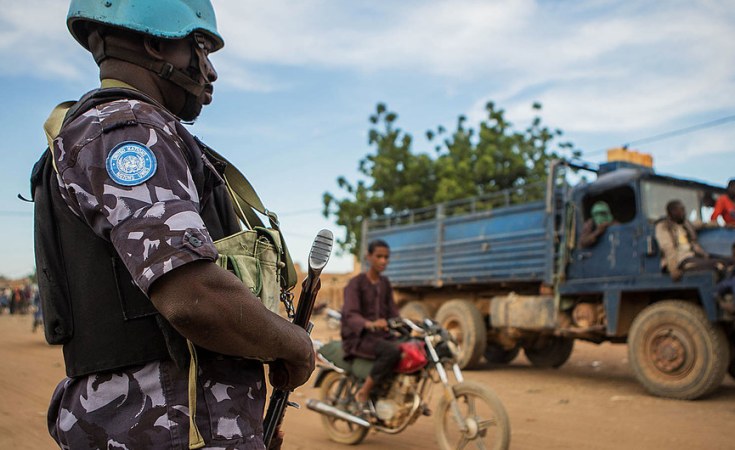Mali's military junta acted unconcerned by the announced withdrawal of German troops from the country. But civil society is worried about yet another ally abandoning military aid for crisis-beset Mali.
After 10 years of trying to help build peace in Mali, Germany is pulling out its troops from the West African country. The Bundeswehr's participation in the UN mission MINUSMA will be ended by May 2024 "according to a very orderly plan," German Defense Minister Christine Lambrecht said, in Berlin, on Tuesday. She explained that the progressive withdrawal was designed to have some troops remain in the country during elections scheduled for February.
Mali's rulers took the news in stride. Fousseynou Ouattara, vice president of the military junta's National Defense, Security and Civil Defense Committee, told DW that the German decision was "much wiser than we expected." The junta had assumed that Germany would "blindly follow France," he added. The French army completed its departure in August.
While emphasizing that Germany was one of his country's most important partners, Ouattara said that the Malian government was against "permanently expanding a foreign military presence on our territory." He alluded to Malian Defense Minister Sadio Camara's statement that the national army was able to defend its own country.
No surprise
This was seconded by Amadou Maiga, parliamentary secretary of Mali's transitional government, who told DW that the German decision came as no surprise. "I think it's just going to require a reorganization of our troops and maybe a little more logistics. But we'll deal with it. We've been expecting this," he said.
Maiga was careful to stress how grateful Mali was for Germany's help. "I think that the cooperation will continue on other levels, like development and security. We thank them and we will face our destiny," he said.
Souleymane Camara, president of the Malian human rights organization LNDH, was less sanguine. "The withdrawal of the forces of countries that came to help contain the advance of the Jihadists is very worrying, because Mali does not have the means to deal with the situation," he told DW.
Plans to recruit 26,000 Malian soldiers
Camara admitted that the junta has plans in place to recruit 26,000 soldiers this year alone. "But it takes years to train and deploy them," he said.
Finding other countries to take the place of those now leaving will be hard, especially because there is a "crisis of confidence between the government and MINUSMA." According to Camara, the resulting void could benefit the jihadists.
The military seized power in Mali in May 2021, disbanding a joint civilian and military executive which was formed after a previous coup in August 2020. The new leaders suspended planned elections, causing the EU to end its training mission in a country increasingly destabilized by radical Islamic rebels.
Fraught relations with Germany
Relations between the new military junta and Germany quickly deteriorated. After eight German soldiers were kept from leaving the country, Berlin briefly suspended its military operations in August. Patrols were resumed in September, but ever since, debates in Germany on whether to stay on in Mali had increased in urgency.
The issue divided the Berlin government of Chancellor Olaf Scholz. Defense Minister Lambrecht did not hide her conviction that it would be best to withdraw Germany's troops. She has accused the junta of deliberately obstructing the UN mission while relying on "Russian forces", a reference to the Kremlin-linked Wagner Group of mercenaries increasingly present in Africa.
Berlin deployed around 1,000 troops to Mali, most near the northern town of Gao. Their main task was to gather reconnaissance for MINUSMA. After Russian forces arrived in Gao, Lambrecht voiced suspicion that they were involved in human rights abuses.
German Foreign Minister Annalena Baerbock had previously pleaded for the Bundeswehr remaining in Mali to ensure the protection of the civilian population. Defense Minister Lambrecht stressed that the German army would become more involved in Niger instead, adding that it would be "irresponsible" to abandon the Sahel region.
Kidnapped German priest
The pervasive insecurity in the region and especially in Mali was emphasized by the disappearance, Monday, of a German priest, believed to have been kidnapped by jihadi insurgents.
Hans-Joachim Lohre, a member of the Missionaries of Africa or White Fathers, is the national secretary of the country's inter-religious dialogue commission. His whereabouts remain unknown and, as of yet, there are no ransom demands.
Reliou Koubakin, Brahima Tounkara and Mahamadou Kane contributed to this article
Edited by: Benita van Eyssen


